【最新】pep小学英语六年级毕业升学考试总复习
六年级下册英语-小升初总复习-时态全解-人教版PEP(共29张PPT)
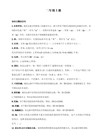
将来时理论
一、 概念:表示将要发生的动作或存在的状态及打算、 计划或准备做某事。 句中一般有以下时间状语: tomorrow, next day(week, month, year…),
soon, the day after tomorrow(后天) this morning , this afternoon , this evening等。
试题演练:
三、 选择正确的答案。 B presents for my parents yesterday. 1. I ____ A. buyed B. bought C. buying C 2. Susan _____ swimming yesterday. A. go B. goes C. went B 3. Danny _____ breakfast five times last week. A. eat B. ate C. eated C Tree Planting Day. 4. Last Sunday____ A. is B. were C. was
试题演练:
一、写出下列动词的过去式或动词原形。 went was 1. go_______ 2. is___________ Lorem ipsum dolor bought 3.buy_______ 5. have had ____
sit amet, consectetur adipisicing elit, sed do eiusmod tempor incididunt ut labore
swam 4.swim__________
6. watched watch _____
eat 7. ate______
get 8. got__________
【最新】pep小学英语六年级毕业升学考试总复习
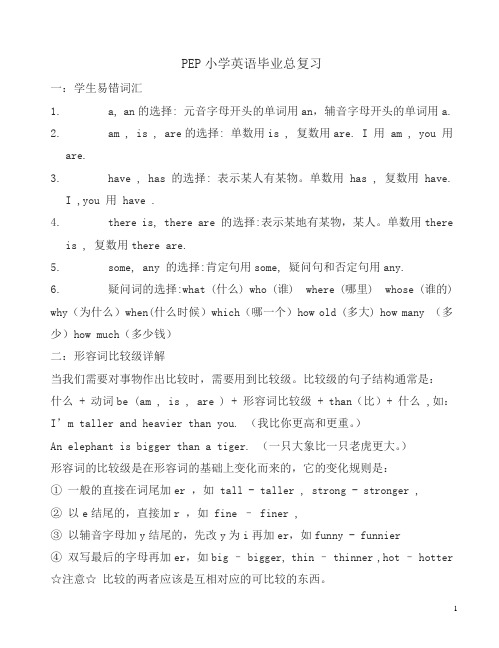
PEP小学英语毕业总复习一:学生易错词汇1. a, an的选择: 元音字母开头的单词用an,辅音字母开头的单词用a.2. am , is , are的选择: 单数用is , 复数用are. I 用 am , you 用are.3. have , has 的选择: 表示某人有某物。
单数用has , 复数用have.I ,you 用 have .4. there is, there are 的选择:表示某地有某物,某人。
单数用thereis , 复数用there are.5. some, any 的选择:肯定句用some, 疑问句和否定句用any.6. 疑问词的选择:what (什么) who (谁) where (哪里) whose (谁的) why(为什么)when(什么时候)which(哪一个)how old (多大) how many (多少)how much(多少钱)二:形容词比较级详解当我们需要对事物作出比较时,需要用到比较级。
比较级的句子结构通常是:什么 + 动词be (am , is , are ) + 形容词比较级 + than(比)+ 什么 ,如:I’m taller and heavier than you. (我比你更高和更重。
)An elephant is bigger than a tiger. (一只大象比一只老虎更大。
)形容词的比较级是在形容词的基础上变化而来的,它的变化规则是:① 一般的直接在词尾加er ,如 tall - taller , strong - stronger ,② 以e结尾的,直接加r ,如 fine – finer ,③ 以辅音字母加y结尾的,先改y为i再加er,如funny - funnier④ 双写最后的字母再加er,如big –bigger, thin –thinner ,hot –hotter ☆注意☆ 比较的两者应该是互相对应的可比较的东西。
pep人教版小学六年级英语下册复习题(5)

pep 人教版小学六年级英语下册精品试卷设计人教版小学六年级英语下册精品试卷设计小学六年级英语毕业复习卷(答题时间60分钟,满分100分)分)内容内容 一 二 三 四 五 六 七 八 九 十合计合计 得分得分听力部分(满分45分)一、Listen and choose 听录音, 选出与录音相符合的一项,并将其字母编号填在题前的括号里(每小题1分,共10分) ( ) 1. A. nine B. by C. bike ( ) 2. A. speak B. sneakers C. skate ( ) 3. A. light B. right C. night ( ) 4. A. west B. best C. next ( ) 5. A. 3rd floor B. 1st floor C. 5th floor ( ) 6. A. shoes B. shorts C. short ( ) 7. A. It A. It’’s windy. B. It B. It’’s snowy. C. It C. It’’s sunny. ( ) 8. A. skating B. swimming C. ice-skating ( ) 9. A. Amy A. Amy’’s uncle is an accountant. B. Amy B. Amy’’s aunt is an actor. C. Amy is a salesperson. ( ) 10. A. John has a new picture book. B. John has a new story-book. C. John has a new English book. 二、Listen and judge 听录音, 判断句子或图片是否与录音内容相符, 相符的在相应题号下的括号内打“√” , 不相符的打“×”(共10分)( ) 1. ( ) 2. ( ) 3.学 校班 别 姓 名 考生答卷不要过此线镇 区( ) ( )4.( ) 5.() 6. Tom went to school by bike yesterday. ( ) 7. Amy 7. Amy can’t can’t can’t wash clothes, but she can water the flowers. wash clothes, but she can water the flowers. () 8. Today is Teachers ’ Day. () 9. Tomorrow is Saturday. () 10. It 10. It’’s summer now. 三、Listen and answer根据你在录音中的问题,将下面每组答句中最合适的答案选出来,并将其前面的字母符号填在句子前面的括号里(每小题2分,共10分) ( ) 1. A. I am going to go tomorrow.B. I am going to go with my father.C. I am going to by bike.( ) 2. A. They are fighting. B . It . It’’s sleeping. C. They are fight. ( ) 3. A. He likes football.B. He B. He’’s tall and strong.C. He C. He’’s an actor.( ) 4. A. I went to the People 4. A. I went to the People’’s Park.B. I go to the park.C. By taxi. () 5. A. It 5. A. It’’s near the bank.B. Take No.2 bus, get off at the cinema.C. C. It’It’It’s next to the shoe store. s next to the shoe store. 四、Listen and fill the blank 根据录音内容填写下列句子中所缺的单词, 使句子完整(每空一词,共5分)1. Where is the? It ? It’’s next to the park. 2. There is a, a mirror and a desk in my bedroom. 3. Peter: What did you do yesterday?John: I went __________.Zoom: __________. 5. How manyare there in the picture? There are 5. 五、Listen and judge根据你在录音中听到的内容判断句子的对错(每小题2分,共10分) () 1. Bill is from America, and he lives in Washington now. () 2. Bill likes music and basketball. () 3. Bill is a boy. He is 13. ( ) 4. Bill Bill’’s mother is a teacher and his father is a worker. () 5. Bill is older than his sister. 笔试部分(满分55分)六、补全对话, 选择正确答案的编号在横线上(共10分,每小题2分) A: I have some fish, cabbage and chicken. B: Are you helpful?C: Pass me a plate, please.D: What time is it now? E: Can you wash the vegetables?F: What did you do after school. G: G: I’I’I’d like some fish ,tomatoes and chicken. d like some fish ,tomatoes and chicken.Amy: Mommy, I Mommy, I’’m home. I m home. I’’m hungry. Mommy:? Amy: I sang and danced after school. I I sang and danced after school. I’’m hungry and tired now. Mommy:? Amy: It It’’s 7:00 Mommy: What would you like for dinner?Amy: . Mommy: Let Let’’s cook dinner together.Amy:OK, Mom. Mommy:? Amy: Yes, I can. I Yes, I can. I’’m going to wash the vegetables. Mommy: Good girl!. Amy: Here you are.Mommy: Thanks. You are helpful. Tonight we can enjoy a special dinner.七、 阅读,选择正确的答案,并把字母编号写在括号里(10分)( 1 ) A young mother and her little girl get on a bus and sit down. The bus conductor comes to ask them to buy the tickets. “I want one ticket to Children Children’’s Park.s Park.”” The conductor looks at the little girl and says to her, The conductor looks at the little girl and says to her, ““How old are you?old are you?”” The girl answers, The girl answers, ““Mother says I am four years old at home , but but I’m I’m I’m two years old on the bus. two years old on the bus. two years old on the bus.”” The young mother The young mother’’s face turns red, very red. Then she buys a half(一半) tickets .( )1. Where do they go? A. Home. B. The park ( )2. How do they go there?A. By train.B. By bus. ( )3. How old is the little girl?A. 4B. 3 ( )4. Why the mother 4. Why the mother’’s face is red? A. She feels hot.B. She teaches her daughter (女儿) to tell a lie (谎言). ( )5.What 5.What’’s the meaning of s the meaning of ““ticket ticket”?”? “ticket ticket””的意思是什么? A .方便面 B. 车票( 2 ) Mr. King has a car. In the morning he takes his children to school in his car. Then he drives to work. Mr. King and his children do not have lunch at home but Mrs. King does. She doesn doesn’’t go to work. She stays at home, does some shopping and does some cleaning in the morning. In the afternoon she usually goes to see some of her friends, has tea and talks a lot with them. Then she cooks supper for her family. Mr. King comes back home much later than his children. The children do not come back in their father father’’s car. They take a bus home. They usually come back home before five.( )1. Mr King goes to work by car.( )2. Mrs King doesn 2. Mrs King doesn’’t have lunch at home. ( )3. Mrs King is a housewife.( )4. The children go back home by car.( )5. They children come back home late.八、短文选词填空(共10空,每空1分)(going, thinner, friend, do, swimming, Sunday, go, shorter, friends, were, went, younger, did)Mike and John are good _______. Mike is 164cm. He is 4cm ________ than John, and_______. John is 14. Mike is only 12. Mike is _______. Usually they ________ homework together on Sundays. Last _________, they _______ hiking and _______. They ________ happy. Next weekend, they they’’re _______ to the zoo.九、根据答句问问题(共5小题,每小题2分)1. A: ___________________________________________?B: It B: It’’s Tuesday today. 2. A: ___________________________________________?B: My nose is sore. 3. A: ___________________________________________?B: You can go to Songshan Lake by bike. It ’s not far. 4. A: ______________________________?B: They are watching folk dances. 5. A: ___________________________________________?B: Mike is going to Dongguan Science Museum. 十.作文(10分)根据表格的信息,用英文来介绍一下Mike 的情况注意语句通顺,意思连贯。
【推荐】人教版小学六年级英语毕业考试综合复习题及听力稿答案
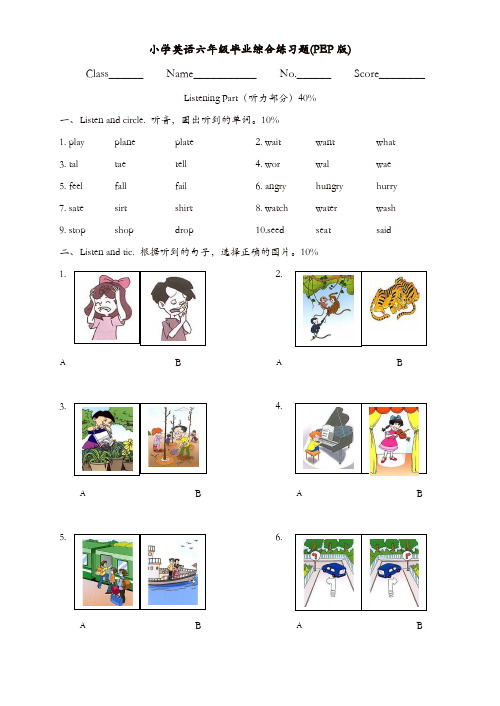
小学英语六年级毕业综合练习题(PEP 版)Class______ Name___________ No.______ Score________Listening Part (听力部分)40%一、Listen and circle. 听音,圈出听到的单词。
10% 1. play plane plate 2. wait want what 3. taltae tell 4. worwal wae 5. feel fall fail 6. angry hungry hurry 7. sate sirt shirt 8. watch water wash 9. stopshopdrop10.seedseatsaid二、Listen and tic. 根据听到的句子,选择正确的图片。
10% 1.2.ABAB3.4.ABAB5.6.ABAB7. 8.ABAB9.10.ABAB三、Listen and choose. 听问句,选择正确的答句。
10% ( )1. A. I ’m 40g.B. I ’m 154cm.C. I ’m 12.( )2. A. She ’s fine. B. He has a cold. C. He feels happy. ( )3. A. Oct. 1st .B. June 1st .C. Jan. 1st .( )4. A. I ’m going to Hong ong.B. I ’m going there by plane.C. I ’m going to buy a boo.( )5. A. She lies watching TV.B. She watches TV every evening.C. She is a TV reporter.四、Listen and match. 听短文,连线。
10%Wei WeiYunnanLiu iNingboLi Ping Hanghouheng Jing HarbinWu Yifan ShanghaiWriting Part(笔试部分)60%五、Writing(正确抄写句子,并圈出其中的元音字母)5%LET US GO SATING六、Read and arrange.将下列人名按照英汉字典中的先后顺序标号。
pep小学英语六年级复习资料

pep小学英语六年级复习资料PEP小学英语六年级复习资料在小学六年级的英语学习中,复习资料是非常重要的。
它们可以帮助学生巩固已学的知识,提高英语水平。
本文将为大家介绍一些PEP小学英语六年级的复习资料。
一、课本复习首先,课本是最基本的复习资料。
学生可以通过阅读课本中的对话、文章和练习题来复习已学的知识。
课本中的对话和文章通常涵盖了各个语法点和词汇,通过阅读和理解这些材料,学生可以回顾和巩固所学的内容。
同时,课本中的练习题也是复习的好帮手。
学生可以通过做课本中的练习题来检验自己的掌握程度。
如果有错题,可以及时纠正,加深对知识点的理解。
二、练习册复习除了课本,练习册也是非常重要的复习资料。
练习册中通常包含了大量的练习题,覆盖了各个知识点。
学生可以通过做练习册中的题目来巩固所学的知识,提高自己的英语能力。
练习册中的题目形式多样,有选择题、填空题、改错题等。
学生可以根据自己的实际情况选择适合自己的题型进行练习。
同时,练习册中的题目还可以帮助学生培养解题的能力和思维逻辑。
三、听力材料复习在英语学习中,听力是非常重要的一项能力。
学生可以通过听力材料来提高自己的听力水平。
PEP小学英语六年级的听力材料丰富多样,包括对话、短文、歌曲等。
学生可以通过听力材料来提高自己的听力理解能力,并加深对词汇和语法的理解。
同时,通过反复听同一段材料,学生还可以提高自己的听力准确性和速度。
四、口语练习在英语学习中,口语是非常重要的一项能力。
学生可以通过口语练习来提高自己的口语表达能力。
可以和同学或老师进行对话练习,或者参加英语角等活动。
在口语练习中,学生可以运用已学的知识,进行日常对话练习。
通过反复练习,学生可以提高自己的口语流利度和准确性。
五、网络资源除了以上介绍的复习资料,网络资源也是学生复习的好帮手。
学生可以通过搜索引擎找到大量的英语学习网站和应用程序。
这些网站和应用程序中通常包含了大量的学习资源,如词汇表、语法讲解、练习题等。
pep人教版小学英语毕业总复习易错题及考试技巧课件

二:形容词比较级详解
• 五:人称和数 人称代词 物主代词 主格 宾格 第一 人称 单数 I(我) me my(我的) 复数 we(我们) us our(我们的) 第二 人称 单数 you(你) you your(你的) 复数 you(你们) you your(你们的) 第三 人称 单数 he(他) him his(他的) she(她) her her(她的) it(它) it its(它的) 复数 they(他们/她们/它们) them their(他们的/她们的/它们的)
二:形容词比较级详解
• 当我们需要对事物作出比较时,需要用到比较级.比较级的句子结构通 常是: 什么 + 动词be (am , is , are ) + 形容词比较级 + than(比)+ 什么 , 如: I'm taller and heavier than you. (我比你更高和更重.) An elephant is bigger than a tiger. (一只大象比一只老虎更大.) 形容词的比较级是 在形容词的基础上变化而来的,它的变化规则是: ① 一般的直接在词尾 加er ,如 tall - taller , strong - stronger , ② 以e结尾的,直接加r ,如 fine – finer , ③ 以辅音字母加y结尾的,先改y为i再加er,如funny - funnier ④ 双写最后的字母再加er,如big – bigger, thin – thinner ,hot – hotter ☆ 注意☆ 比较的两者应该是互相对应的可比较的东西. 典型错误:My hair is longer than you.(我的头发比你更长.) 比较的两者是我的头发, 你(整个人),那么比较的对象就没有可比性. 应该改为:My hair is longer than yours. 或My hair is longer than your hair. 比较级专项练习: 一,从 方框中选出合适的单词完成句子 heavy tall long big (1) How is the Yellow River (2) How is Mr Green He's 175cm. (3) How are your feet I wear size 18. (4)How is the fish It's 2kg. 二,根据句意写出所缺的单 词 (1) I'm 12 years old. You're 14. I'm than you. (2) A rabbit's tail is than a monkey's tail. (3) An elephant is than a pig. (4) A lake is than a sea. (5) A basketball is than a football.
pep人教版小学英语毕业总复习易错题及考试技巧课件

一:学生易错词汇
• 1. a, an的选择: 元音字母开头的单词用an,辅音字 母开头的单词用a. 2. am , is , are的选择: 单数用 is , 复数用are. I 用 am , you 用 are. 3. have , has 的选择: 表示某人有某物.单数用has , 复数用have. I ,you 用 have . 4. there is, there are 的选择:表示 某地有某物,某人.单数用there is , 复数用there are. 5. some, any 的选择:肯定句用some, 疑问句 和否定句用any. 6. 疑问词的选择:what (什么) who (谁) where (哪里) whose (谁的) why(为什 么)when(什么时候)which(哪一个)how old (多大) how many (多少)how much(多少钱)
二:形容词比较级详解
• 三,根据中文完成句子. (1) 我比我的弟弟大三岁. I'm than my brother. (2) 这棵树要比那棵树高. This tree than that one. (3) 你比他矮四厘米. You are than he. (4) 谁比你重 than you 三:动词过去式详解 动词的过 去式的构成规则有: A,规则动词 ① 一般直接在动词的后面加ed:如 worked , learned , cleaned , visited ② 以e结尾的动词直接加d:如 lived , danced , used ③ 以辅音字母加y结尾的动词要改y为i再加 ed(此类动词较少)如 study – studied carry – carried worry – worried (注意play,stay不是辅音字母加y,所以不属于此类) ④ 双写最后一个字 母(此类动词较少)如 stopped B,不规则动词(此类词并无规则,须熟记) 小学阶段要记住以下动词的原形和过去式:sing – sang , eat – ate , see – saw , have – had , do – did , go - went , take - took , buy bought , get - got , read - read ,fly - flew , am/is - was , are - were , say - said , leave - left , swim - swam , tell - told , draw - drew , come - came , lose - lost , find - found , drink - drank , hurt - hurt , feel - felt 四:动词现在分词详解 动词的ing形式的构成规则: ① 一般的直接在后 面加上ing , 如doing , going , working , singing , eating ② 以e 结尾的 动词,要先去e再加ing ,如having , writing ③ 双写最后一个字母的(此类 动词极少)有:running , swimming , sitting , getting
新PEP小学英语六年级总复习资料

新PEP小学英语六年级总复习资料小学英语教材所选内容均来源于学生学习及日常生活,为学生所熟悉的。
因此,教师得抓住时机,充分运用教材,从起始年级,培养学生良好的说话的习惯。
小编在这里整理了英语相关知识,快乐看看吧!新PEP小学英语六年级总复习资料一. 反义词big(大的)--- small(小的) black(黑色)---white(白色) free(闲的)---busy(忙的)hot(热)---cold(冷) same(相同的)祝福您及家人身体健康、万事如意、阖家欢乐!祝福同学们快乐成长,能够取得好成绩,为祖国奉献力量!祝福您及家人身体健康、万事如意、阖家欢乐!祝福同学们快乐成长,能够取得好成绩,为祖国奉献力量!---different(不同的) cool(凉爽)---warm(暖和)tall(高的)---short(矮的) long(长的)---short(短的) young(年轻的)---old(老的)here(这里)---there(那里) before(之前)---after(之后) new(新的)---old(旧的)二. 单词归类1.国家(country)China中国 America美国 Australia澳大利亚 Japan日本England英国 Canada加拿大 France法国2.国籍(nationality)Chinese中国人American美国人Australian澳大利亚人Japanese日本人English英国人 Canadian加拿大 French 法国人3.语言(language)Chinese汉语 Japanese日语 English英语 French 法语4.科目(subject)Chinese语文 maths 数学 English 英语 art 美术music音乐 P.E. 体育 computer 电脑 science科学5.星期(week)Sunday星期日 Monday星期一 Tuesday星期二 Wednesday星期三Thursday星期四 Friday星期五 Saturday星期六6.季节(season) spring 春天 summer夏天 autumn秋天 winter 冬天7.月份(month)January一月 February 二 March三月 April四月 May五月 June 六月July 七月August 八月September 九月October 十月November十一月 December十二月8.节日(festival)Spring Festival 春节 Dragon Boat Festival龙舟节 Mid-autumn Festival中秋节New Year’s Day元旦National Day 国庆节Children’s Day儿童节Easter复活节 Halloween万圣节 Christmas 圣诞节Women‘s Day妇女节Teacher’s Day 教师节May Day劳动节9.患病(illness): have a fever发烧hurt疼痛have a cold感冒have a toothache牙疼have a headache头疼have a sore throat喉咙疼10.食物(foods)cake蛋糕 mooncake月饼 dumpling 饺子 bread 面包 pork猪肉fish鱼肉chicken 鸡肉meat肉beef 牛肉egg鸡蛋rice米饭soup汤 salad 沙拉 sandwich三文治 pizza 比萨饼 hamburger 汉堡包 noodles 面条11.时间(time)year年month 月week周date日期day 白天hour 小时morning早上afternoon下午evening晚上yesterday昨天today今天tomorrow明天 next week下个周 last weekend上个周末 last year 去年 the day before yesterday前天 two months ago12.服装(clothes)T-shirt T恤衫 sweater毛衣 coat 大衣 shorts短裤 jeans牛仔裤hat帽子cap帽子 shoe鞋子 sock 短袜 glove 手套scarf 围巾dress连衣裙skirt短裙shirt衬衫13.动物(animals)chicken鸡 duck鸭 goose鹅 dog狗 cat 猫 pig猪 sheep绵羊goat 山羊horse马lion狮子tiger老虎elephant 大象snake蛇kangaroo 袋鼠 monkey 猴子bear 熊 panda熊猫 whale鲸 hen母鸡 mouse老鼠 giraffe长颈鹿 deer鹿14.颜色(colour)grey 灰色 red红色 green绿色 yellow黄色 blue蓝色 white白色 black黑色pink粉红色 orange橙色 brown褐色 purple紫色15.饮料(drinks):juice汁 milk 牛奶 Coke可乐 tea茶 coffee 咖啡 water 水16.数字基数词:one 一 two 二 three三 four四 five五 six 六 seven七eight八 nine 九 ten十 eleven 十一 twelve 十二 thirteen 十三 fifteen 十五 twenty二十thirty 三十 forty 四十 fifty五十 hundred 百 thousand 千 million 百万序数词:first 第一 second第二 third第三 fifth第五 sixth第六seventh第七eighth第八ninth第九twelfth 第十二twentieth 第二十thirtieth第三十17.植物、水果蔬菜tree 树 flower花 grass草 fruit 水果 apple苹果 pear 梨 orange 橙 banana 香蕉 grape葡萄 peach桃子 strawberry草莓watermelon 西瓜pineapple菠萝vegetable蔬菜tomato西红柿potato马铃薯onion洋葱 cabbage卷心菜 green beans豆角18.职业(jobs)worker工人 farmer农民 doctor医生 nurse护士 teacher 教师driver司机 cook厨师 police officer警察 singer歌唱家cleaner清洁工postman邮递员fisherman 渔夫pilot飞行员coach教练businessman商人19、自然界sun太阳 moon月亮 star星星 sky天空 river江河 lake 湖 sea大海 hill山mountain山脉 snow雪 wind风 cloud云 rain雨20、天气(weather)sunny阳光明媚的windy有风的cloudy多云的snowy下雪的rainy下雨的 dry干燥的wet湿的 warm暖的 cool凉爽的 cold冷的 hot热的21、人体部分head头 hair头发 hand手 face脸 eye眼 ear耳朵 nose鼻子 leg 腿 foot脚22、人people人们 man男人 woman妇女 child小孩 grandparents祖父母 parents父母 father父亲 mother母亲 sister姐妹 brother兄弟cousin堂兄 uncle舅舅、叔叔 aunt阿姨23、文具pen钢笔 pencil铅笔 rubber橡皮 ruler尺 knife小刀 map地图dictionary字典24、建筑与房屋部分bedroom卧室living-room客厅kitchen厨房study书房washroom 卫生间 garden花园 office办公室 bank银行 school学校hospital医院cinema电影院park公园zoo动物园shop商店bookstore书店supermarket超市library图书馆museum博物馆post office邮局TV station电视台hotel宾馆wall墙floor 地板window 窗 door门25.日用品lamp台灯 light灯 telephone电话 clock钟 fridge冰箱 cup杯glass玻璃杯 box盒子 bowl碗26.方位词left左 right右 in front of 在前面 behind后面 near附近 next to与相邻27.家具bed床 desk书桌 table桌子 chair椅子 shelf 书架sofa沙发28.餐食meal一顿饭 breakfast早餐 lunch 午餐 dinner晚餐29.交通工具bus公共汽车 train火车 car小汽车 bike自行 ship轮船 boat小船 plane飞机 ferry轮渡 subway地铁 taxi出租车30.外貌tall高的 short矮的 fat胖的 thin 瘦的healthy健康的 nice好看的 beautiful(pretty)美丽的strong强壮的 old 老的 young 年轻的 heavy重的31.性格clever(smart)聪明的active活跃的quiet安静的shy 害羞的hard-working勤奋的strict严厉的kind和蔼的polile 有礼貌的helpful乐于助人的能干的四.动词词组go shopping去购物 go fishing去钓鱼 go boating去划船 go swimming 去游泳go skiing 去滑雪 go skating去溜冰 go for a walk 去散步 go hiking去远足 go on a picnic去野餐 go camping去野营 go to the cinema 去看电影 go to bed去睡觉 go to school去上学 go to work 去上班 go back回来 go out出去play football 踢足球play basketball打篮球play table tennis(play ping-pong)打乒乓球play badminton 打羽毛球 play the piano 弹钢琴 play games 玩游戏 write a letter写信listen to music听音乐 watch TV 看电视 see a film 看电影 take photos(pictures)照相clean the room打扫房间 wash clothes洗衣服 draw a picture 画画 have breakfast 吃早餐 have lunch 吃午餐 have dinner 吃晚饭do housework 做家务do my homework做作业have a Chinese lesson 上语文课take a dancing class上舞蹈课do morning exercises晨练pick apples 摘苹果plant trees种树wait for等候make cakes 做蛋糕 make the bed 铺床make a card 做卡片look for 寻找 put on穿上 wake up醒来 get up 起床五. 介词短语a pair of 一双 a lot of 许多 on the farm在农场 in front of在…前面 in the sky 在空中 on foot步行 in the morning 在早上in the afternoon在下午 in the evening在晚上 at night在晚上 at school 在学校 at home在家六、易错词汇1. a, an的选择: 元音字母开头的单词用an,辅音字母开头的单词用a.2. am , is , are的选择: I 用 am , you 用 are. 第三人称单数用is , 复数都用are.3. have , has 的选择: 表示某人有某物。
2023年人教PEP版六年级下册英语小升初总复习专项复习单选试题

人教PEP版小学英语小升初总复习专项复习单选题精选精练附答案解析1.Beijing is in the north of . ()A.England B.America C.China2.I am young and my grandpa is . ()A.long B.small C.old3.I usually do my homework the evening. ()A.on B.at C.in4.These are apples and those are . ()A.watermelon B.bananas C.orange5.Amy is going to read a comic book ______ animals. ()A.in B.at C.about6.Does he want to ______ your pen friend? ()A.is B.are C.be 7.—Mike, this is my friend, Dick. ()—A.Thank you. B.Good! C.Nice to meet you. 8.—Could you get to the park before 3 o'clock? ()— . I’ll still be at the meeting then.A.I think so B.Yes, I could C.I'm afraid not 9.—today! ()—Yes, shall we have a picnic in the open air?A.What fine weather isB.How fine weather it isC.How fine the weather is10.—do you fee1? ()—I’ve got a headache. I feel terrible.A.How B.What C.Where 11.—What are you going to do next weekend? ()—I’m going to .A.visit my grandma B.visiting grandma C.will visit grandma 12.—Where are you from? ()—I’m from .A.the UK B.British C.English 13.—Does he live in London? ()—No, he in a small town near London.A.live B.lives C.live14.—Oh, the pencil is so nice. May I have a look? ()—A.No, I don't. B.I like it. C.Sure. Here you are. 15.—is that T-shirt? ()—It's 50 yuan.A.How many B.How much C.How 16.—What’s the weather like today? ()—A.It’s sunny. B.It’s in the desk. C.It’s Jan.1st. 17.Nancy likes dancing. Helen likes dancing, ______. They ______ have the same hobby. ()A.too; all B.too; both C.to; both18.She likes _______, but she doesn't _______ doing housework. () A.cooking; like B.cook; to like C.cooking; likes 19.These are ________. ()A.women B.woman C.womans 20.Summer ______ in December in Australia. ()A.start B.starts C.starting21.—______ are you doing? ()—I'm flying kites.A.Where B.What C.How22.Candy is _______. ()A.sour B.short C.sweet23.I like _______. ()A.strawberry B.strawberries C.strawberrys 24.We have these black trousers and those blue _______. ()A.one B.ones C.it25.Let’s go and _______. ()A.have a look B.have look C.have an look26.I like _______ more than _______. ()A.swim; dance B.swimming; dance C.swimming; dancing 27.I would like some _______. ()A.sandwichs B.tomatoes C.hamburger28.I _______ a nice bedroom. _______ are two bedrooms in the house. () A.have; There B.have; Their C.has; They29.Dogs can help ________ your home ________. ()A.keep; safe B.to keep; safely C.keeps; safe 30.______ summer, I swim in the lake. ()A.In B.On C.At31.You must pay _________ to the traffic lights.()A.from B.attention C.thanks32.I am waiting ________ you for a long time.()A.with B.of C.for 33.—Mum, I’m thirsty. I’d like some _______. ()—OK. Here you are.A.ice cream B.chicken C.orange juice 34.To keep _______, you should do more sports. ()A.health B.healthy C.safely 35.There _______ any juice in the glass. Have some water, please. () A.isn’t B.is C.aren’t 36.The Grand Canyon is in _______. ()A.the USA B.the UK C.Australia 37.The baby is sleeping. Please be _______. ()A.quiet B.quietly C.quickly参考答案及解析1.C解析:略2.C解析:略3.C解析:略4.B解析:略5.C解析:略6.C解析:略7.C解析:略8.C解析:略9.C解析:略10.A解析:略11.A解析:略12.A解析:略13.B解析:略14.C解析:略15.B解析:略16.A解析:句意为:—今天天气怎么样?—____________。
PEP六年级英语毕业复习

PEP六年级英语毕业复习计划对于我们六年级老师和学生来说,伴随着新课的结束,紧张的复习工作即将开始。
复习能让学生巩固所学知识,还能进行查漏补缺,使学生能顺利地完成小学阶段的学习任务,能在毕业考试中取得好成绩,同时也为今后的学习打下坚实的基础。
下面谈一谈我的复习设想。
一、总体设想针对目前我们学校的现状,在复习过程中我准备以听说读写为主要复习形式,以英语基础知识为主要内容,指导学生在听说读写的过程中系统地梳理所学知识,从单词到词组到句子到短文,全面把握所学内容。
二、具体实施办法(一)全面复习抓基础,帮助学生全面而系统地复习所学过的知识。
1.过好单词关。
单词是学习英语的基础,针对目前学生中存在的基础差、习惯差的现状,根据小学生的年龄特点以及记忆与遗忘的规律,学生在反复记忆相同的内容能使这些内容长期储存在记忆里,不易遗忘。
因此我准备从不同角度,用不同方法帮助学生复习单词。
(1)按词性归类复习单词。
(2)按所含元音字母及字母组合归类复习单词。
(3)按词汇表复习单词。
加强单词的朗读与默写,给学生明确的任务,并采用短频快的方式,这样学生一方面可以做好充分准备,一方面容易获得成功。
当然对于极个别学困生来说,还要区别对待,给他们适当降低难度和要求,使他们也能尽最大努力过好单词关。
2.过好词组关。
词组是学习英语的关键,它是复习单词的良好途径,同时又是学习句子的基础。
我准备将词组复习与单词分类复习相联系,在复习单词的同时一起复习词组让学生在复习单词的同时掌握词组构成的规律。
3.过好句子关。
句子是学习英语的重点。
通过几年的学习,学生已经掌握了一定数量的句型及日常交际用语,大多数学生现在已经能比较自如地运用这些句子,但对一部分学生来说,还处于朦胧状态,因此我准备从以下几方面来帮助学生梳理所学过的句子。
(1)指导学生在语境中复习句子,让学生分清日常交际用语的运用场合。
(2)根据句子类型指导学生在比较中复习句子,教给学生适当的语法知识。
PEP小学六年级的英语总总结复习试卷习题
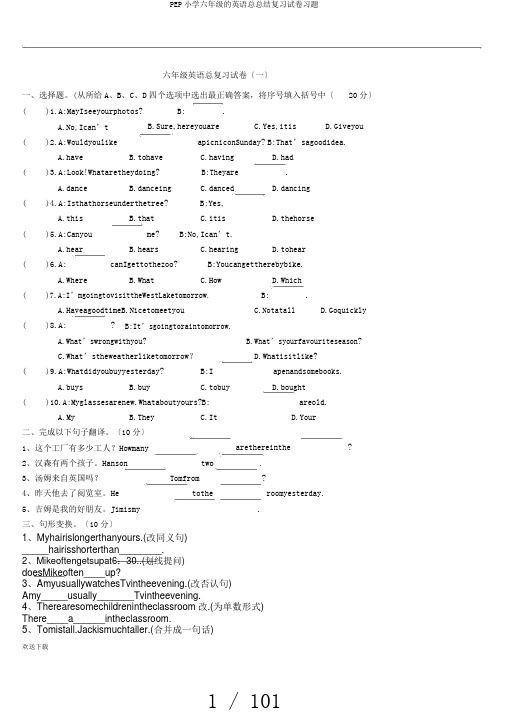
-六年级英语总复习试卷〔一〕一、选择题。
(从所给A、B、C、D四个选项中选出最正确答案,将序号填入括号中〔20分〕()1.A:MayIseeyourphotos?B:.A.No,Ican’tB.Sure,hereyouareC.Yes,itisD.Giveyou ()2.A:Wouldyoulike apicniconSunday?B:That’sagoodidea.A.haveB.tohaveC.havingD.had()3.A:Look!Whataretheydoing?B:Theyare.A.danceB.danceingC.dancedD.dancing()4.A:Isthathorseunderthetree?B:Yes,A.thisB.thatC.itisD.thehorse()5.A:Canyou me?B:No,Ican’t.A.hearB.hearsC.hearingD.tohear()6.A:canIgettothezoo?B:Youcangettherebybike.A.WhereB.WhatC.HowD.Which()7.A:I’mgoingtovisittheWestLaketomorrow.B:.A.HaveagoodtimeB.NicetomeetyouC.NotatallD.Goquickly ()8.A:?B:It’sgoingtoraintomorrow.A.What’swrongwithyou?B.What’syourfavouriteseason?C.What’stheweatherliketomorrow?D.Whatisitlike?()9.A:Whatdidyoubuyyesterday?B:I apenandsomebooks.A.buysB.buyC.tobuyD.bought()10.A:Myglassesarenew.Whataboutyours?B:areold.A.MyB.TheyC.ItD.Your二、完成以下句子翻译。
PEP 小学英语六年级毕业复习试卷二

PEP小学英语六年级毕业复习试卷二听力部分一、听录音,选择你听到的单词、短语或汉语意思。
(10分)( ) 1. A. younger B. stronger C. longer D. thinner( ) 2. A.牙疼 B. 头疼 C. 喉咙疼 D. 感冒( ) 3. A. skiing B. skating C. sick D. swimming( ) 4. A. 生气的 B. 兴奋的 C.疲劳的 D.无聊的( ) 5. A. eat B. ate C. get D. feet()6、A. make B. take C. lake D. grade()7、A. park B. dark C. card D. find()8、A. speak B. sleep C. read D. seat()9、A. look B. book C. cook D. good()10.A. dear B. here C. clear D. wear二、听录音,根据你所听到的句子,选出正确的答语,并将其代号填入前面的括号内。
每个句子听三遍。
(10分)( )1.A、I’m 164cm. B、I’m 13 C、I 50kg.( ) 2.A、I’m fine. B、It’s a book. C、It’s sunny.( ) 3.A、I’m a boy. B、I feel sick. C、I’m 16( ) 4.A、I’m going to school. B、I went to Dili. C、I went on foot.( ) 5.A、I’m going to Beijing B、By plane. C、I’m fine.三、听录音,填空。
(10分)1 . Amy is _______ and _________ than Sarah .2 . John is _________ . His throat is __________ .3 . Zhang Peng _______ English at home last weekend.4 . Did you ________ the room___________ ?5 . He _______ ___________ on his holiday.6.. Last weekend I _________a song.笔试部分一、按要求写出单词:(10分)1.Number缩写_____ 2.drive 名词____ 3.far反义词____4。
新PEP六年级英语总复习及练习精选全文完整版

可编辑修改精选全文完整版六年级英语毕业总复习一单词名词动词形容词可数不可数原型进行式过去式第三人称单数原型比较级apple water do doing did does fat fatter(将来时、一般现在时)(一般现在时)单数复数apple apples一、定义:名词可以分为可数名词和不可数名词,不可数名词没有单复数,一律看作单数。
二、可数名词:分为单数和复数⑴单数:以元音音标a e i o u 开头的单数用an(一个),其他用a(一个)或者one +单数复数:some(一些)加复数或者不可数名词;或者大于1的具体数字+复数⑵可数名词单数→复数的变化规则:三、不可数名词:以下词为常为不可数名词,他们的复数形式就是他们本身。
water 水milk牛奶tea 茶rice米饭juice 果汁bread面包meat 肉四、人称代词:be 动词am , is , are的选择: 单数用is , 复数用are,I 用am , you 用are.练习题一、选择a或an或some.pen bag apple big applebananas orange books water二、写出下列各词的复数.watch _______ child _______ day________ foot________ book_______ sheep ______ box_______ peach______ man______fish _______ paper_______三、选择:1、There on the wall .They are very beautiful.A. are photoesB. are photos2、That’s book.A. anB. a3、There some in the river.A. are, fishesB. are ,fish4. Would you like _______ ,please?A. some watersB. some water5、Do you want to drink much ?A、a milkB、milk四、选择be(am is are ) 填空。
小升初总复习选择(试题)人教PEP版英语六年级下册

人教PEP小学英语小升初总复习选择题精选精练附答案解析1._______, so don’t keep others waiting. ()A.Picking flowers is wrongB.Being late is not politeC.Swimming in the river is dangerousD.Throwing rubbish everywhere is not good2.—_______ is not good for our health. ()—I think so. And we should do more sports.A.Doing more exercises B.Eating too muchC.Going to bed on time D.Taking a walk after supper 3.My friend _______ me. I have to leave now. I should be punctual(守时的). () A.wait B.is waiting for C.wait for D.is waiting 4.Li Wei is a basketball fan, he wants to be a player like _______. () A.Yao Ming B.Li Na C.Ma Long D.Zhu Ting 5.When China is in winter, _______ is in summer. ()A.Canada B.America C.Australia D.France 6.You can get there _______ subway. ()A.by B.take C.to D.of7.A rainbow has _______ kinds of colors. ()A.five B.six C.seven D.two 8.Today, a new student will come to our class.We should say “_______”to him. ()A.welcome B.happy birthdayC.goodbye D.that’s all right9.Spring comes. _______ wake up from their long sleep. ()A.Bears B.Cats C.Dogs D.Tigers 10.Americans often eat _______ on Thanksgiving Day. ()A.noodles B.turkeys C.dumplings D.meat 11.Colin ________ a joke at the English party. ()A.visited B.told C.won D.bought 12.—Can I go out, Dad? ()—________ It's time to study.A.All right. B.Sorry. I wouldn't like to do that. C.It doesn't matter. D.I'm afraid you can't.13.I can cook the meal ________ myself. ()A.on B.with C.by D.about 14.Today is World Car Free Day. People have to ________ to work by bike. () A.go B.goes C.went D.going 15.We will go away from home ________. ()A.now B.just now C.yesterday D.right now 16.My ________ were there two days ago. ()A.wallet B.gloves C.scarf D.school bag 17.Amy does ________ in English. ()A.good B.well C.hungry D.busy 18.Lucy did ________ housework all day today. ()A.a B.an C./ D.one 19.—Where is John? ()—______ front of the hospital.A.In B.On C.To D.At 20.September 10th is _______. We should say “thank you”to our teachers. ()A.Teachers’Day B.Children’s DayC.Mother’s Day D.Father’s Day21.In _______, the farmers are busy farming the land. ()A.summer B.spring C.autumn D.winter22.Children in China often have _______ for their lunch. They’re healthy. () A.rice and vegetables B.candy and jelly C.hamburgers and Coke D.fried chicken and chips 23.—In China, children under 14 can take a day off to celebrate a festival on June 1st. ()—Oh, that's China's Children's Day. _______A.How nice! B.What a pity! C.How boring! D.How bad! 24.My father is a ________. He works in a ________. ( )A.pilot; hospital B.scientist; cinemaC.coach; gym D.doctor; school25.Sam and I _________ going to _________. ()A.am; take a trip B.are; taking a tripC.are; take a trip D.is;make a trip26.—What about going to the West Lake?()—__________A.What? B.I can go.C.That’s a great idea. D.Yes, I am.27.Don’t _________ afraid _________ it. It’s nice. ()A.are; for B.be; of C.be; to D.is; of 28.There ______ a backpack and a few books on the desk. ()A.am B.is C.are D.have 29.Have you got ________ postcards from China? ()A.some B.any C./ D.a 30.—What do people do on summer holiday? ()—They _________.A.go swimming B.go skatingC.sweep the snow D.clean the window31.—Does your mother go to work by car? ()—__________A.Yes, he is. B.Yes, he does. C.Yes, she does. D.Yes, she do. 32.—Excuse me. ________ do I get to the zoo?()—Go straight on. It’s on the right.A.WhenB.WhereC.HowD.What33.—Where are you going? ()—I am going _________.A.next Monday B.to the cinemaC.to make a cake D.to play football34.—Li Mei, what do you often do on Mid-Autumn Festival in China? () —We often get together and ___________ with our family.A.eat jiaozi B.eat mooncakes C.eat zongzi D.eat rice 35.It takes ______ ten minutes to school every morning. ()A.them B.they C.their D.theirs 36.When did you _______ to school yesterday? ()A.go B.went C.going D.goes参考答案及解析1.B详解:句意:______,所以不要让别人久等。
(最新)pep小学六年级毕业班英语复习提纲
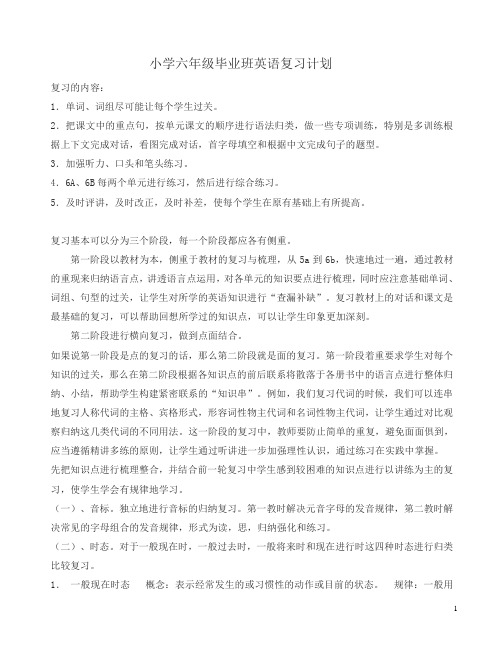
小学六年级毕业班英语复习计划复习的内容:1.单词、词组尽可能让每个学生过关。
2.把课文中的重点句,按单元课文的顺序进行语法归类,做一些专项训练,特别是多训练根据上下文完成对话,看图完成对话,首字母填空和根据中文完成句子的题型。
3.加强听力、口头和笔头练习。
4.6A、6B每两个单元进行练习,然后进行综合练习。
5.及时评讲,及时改正,及时补差,使每个学生在原有基础上有所提高。
复习基本可以分为三个阶段,每一个阶段都应各有侧重。
第一阶段以教材为本,侧重于教材的复习与梳理,从5a到6b,快速地过一遍,通过教材的重现来归纳语言点,讲透语言点运用,对各单元的知识要点进行梳理,同时应注意基础单词、词组、句型的过关,让学生对所学的英语知识进行“查漏补缺”。
复习教材上的对话和课文是最基础的复习,可以帮助回想所学过的知识点,可以让学生印象更加深刻。
第二阶段进行横向复习,做到点面结合。
如果说第一阶段是点的复习的话,那么第二阶段就是面的复习。
第一阶段着重要求学生对每个知识的过关,那么在第二阶段根据各知识点的前后联系将散落于各册书中的语言点进行整体归纳、小结,帮助学生构建紧密联系的“知识串”。
例如,我们复习代词的时候,我们可以连串地复习人称代词的主格、宾格形式,形容词性物主代词和名词性物主代词,让学生通过对比观察归纳这几类代词的不同用法。
这一阶段的复习中,教师要防止简单的重复,避免面面俱到,应当遵循精讲多练的原则,让学生通过听讲进一步加强理性认识,通过练习在实践中掌握。
先把知识点进行梳理整合,并结合前一轮复习中学生感到较困难的知识点进行以讲练为主的复习,使学生学会有规律地学习。
(一)、音标。
独立地进行音标的归纳复习。
第一教时解决元音字母的发音规律,第二教时解决常见的字母组合的发音规律,形式为读,思,归纳强化和练习。
(二)、时态。
对于一般现在时,一般过去时,一般将来时和现在进行时这四种时态进行归类比较复习。
1.一般现在时态概念:表示经常发生的或习惯性的动作或目前的状态。
(2021年整理)小学PEP英语毕业总复习之各册知识点

小学PEP英语毕业总复习之各册知识点编辑整理:尊敬的读者朋友们:这里是精品文档编辑中心,本文档内容是由我和我的同事精心编辑整理后发布的,发布之前我们对文中内容进行仔细校对,但是难免会有疏漏的地方,但是任然希望(小学PEP英语毕业总复习之各册知识点)的内容能够给您的工作和学习带来便利。
同时也真诚的希望收到您的建议和反馈,这将是我们进步的源泉,前进的动力。
本文可编辑可修改,如果觉得对您有帮助请收藏以便随时查阅,最后祝您生活愉快业绩进步,以下为小学PEP英语毕业总复习之各册知识点的全部内容。
PEP小学英语毕业总复习各册知识点三年级上册重点单词pen (钢笔) pencil (铅笔) pencil-case (铅笔盒)ruler(尺子) eraser(橡皮) crayon (蜡笔) book (书) bag (书包) sharpener (卷笔刀) school (学校)head (头) face( 脸) nose (鼻子) mouth (嘴) eye (眼睛) leg (腿) ear (耳朵) arm (胳膊) finger (手指) leg (腿) foot (脚) body (身体)red (红色的) yellow (黄色的) green (绿色的) blue (蓝色的)purple (紫色的) white (白色的) black (黑色的) orange (橙色的) pink (粉色的)brown (棕色的)cat (猫) dog (狗) monkey (猴子) panda (熊猫)rabbit (兔子) duck (鸭子) pig (猪) bird (鸟) bear (熊)elephant (大象)mouse (老鼠)squirrel (松鼠)(蛋糕) bread (面包) hot dog (热狗) hamburger (汉堡包) chicken (鸡肉) French fries (炸薯条)coke (可乐) juice (果汁)milk (牛奶) water (水)tea (茶) coffee (咖啡)one (一) two (二) three (三) four (四) five (五)six( 六) seven (七) eight (八) nine( 九) ten( 十) doll (玩具娃娃) boat (小船)ball (球) kite (风筝)balloon (气球) car (小汽车) plane (飞机)重点句型1、向别人问好应该说――A: Hello!(你好!)B: Hi! (你好!)2、问别人的名字应该说-―A:What’s your name?你的名字是什么?B:My name’s Chen Jie。
pep小学英语毕业考总复习重点(六年级)

小学英语毕业考总复习重点(六年级-新版教材)1.-Where is the cinema?(电影院在哪里?)-next to the bookstore.)-Where is the science museum?(科学博物馆在哪里?)-near the library.)2.-How can I get to the science museum?(我要怎样才能到科学博物馆?))(我们要怎样才能到那里?)(到书店左转。
然后走到医院右转。
)3.-How do you go to school?(你怎样去学校?)-I go to school by subway. / By subway. /I (often) go by subway.(我乘地铁去上学。
)-How do you come to school?(你怎样来学校?)-I come to school on foot. /On foot. /I (usually) come on foot.(我走路来上学。
)(我们怎样到那儿?)-By bus. / We get there by bus.(我们坐公交车到那儿。
)4.-What are you going to do tomorrow?(你明天打算干什么?)-I’m going to (我打算去看场电影。
)-What are you going to buy?(你打算去买什么?)-I’(我打算去买几本词汇书。
)-What are they going to do next week?(他们周末打算干什么?)-They are going to take a trip.)-What is he going to do today?(他今天打算干什么?)-He is going to wash clothes.(他打算洗衣服。
)-What is she going to do this afternoon?(她今天下午打算干什么?)-She is going to sleep.(她打算睡觉。
小升初总复习选择(试题)人教PEP版英语六年级下册

人教PEP小学英语小升初总复习选择题精选精练附答案解析1.When I was a baby, my hair _______ short, my eyes _______ big. () A.were; was B.was; was C.was; were D.were; were 2.Thanksgiving is ________ favourite festival. ()A.me B.my C.I D.myself 3._____ at the cinema, and then _____ left. ()A.Get on; go B.Get off; go C.Get off; turn D.Get off; go 4.—__________ ()—I’m going to play basketball.A.What do you do?B.What are you going to do tomorrow?C.What are you doing now?D.What did you do yesterday?5.My sister ________ the picture and ________ a sentence. ()A.point at; sayB.pointed at; saysC.pointed at; saidD.point at; said6.He often ________ with his friends last summer. ()A.went swimming B.goes swimming C.goes swim D.went swim 7.—May I speak to Danny? ()—______A.Yes, please. B.No, you can't. C.This is Danny. D.That is me. 8.—What can you see in the sky when it’s dark? ()—________A.I can see the sun and the moon. B.I can see the moon and stars. C.I can see the sun and stars. D.I can see the sun and flowers.9.—Touch the rabbit. How does it feel? ()—________A.It’s hard. B.It’s soft. C.It’s sweet. D.It’s sour. 10.They often _______ after supper. ()A.go a walk B.go for a walk C.goes a walk D.goes for a walk11.—________ is Mike going? ()—He’s going to the bookstore.A.WhenB.WhatC.WhereD.Who12.Have you got ________ books about the US? ()A.any B.some C.a D.an 13.—Lily, What do you do in winter? ()—I ______ in the snow.A.played B.play C.plays D.playing 14.You can use ________ for noodles and ________ for soup. () A.chopsticks; spoons B.spoons; forks C.forks; chopsticks D.chopsticks; forks15.—________ do you like spring best? ()—Because the weather is nice.A.Where B.Why C.What D.When 16.Let’s go ______ a picnic this weekend. ()A.in B.on C.at D.of17.She is going to buy a __________. ()A.comic book B.English book C.storybooks D.postcards 18.My computer doesn’t work. May I use it ________ you finish the work? ()A.and B.after C.but D.though 19.Once upon a time, there ________ many wild animals in the forest. () A.is B.was C.were D.are 20.My father usually ______ at 6:00 a.m. ()A.play sports B.playing sports C.plays sports D.play sport 21.Let me ________ some bananas ________ the trees. ()A.draw; in B.to draw; on C.drew; on D.draw; on 22._______ kind of animal is a kangaroo? ()A.Where B.What C.How D.What about 23.Penguins are a kind of _______. ()A.mammal B.insect C.bird D.reptile 24.—Where is Lhasa? ()—It’s in the _______ of China.A.north B.south C.west D.east 25.You can also ride _______ the London Eye. ()A.with B.on C.in D.about 26.The little girl slips on the banana skin and ________. ()A.fall B.falling C.fell D.falls 27.There ________ so many trees on Earth ten years ago. ()A.are B.was C.were D.is28.Is the dinner ________? I’m hungry. ()A.good B.ready C.well D.nice 29.We should not ________ water. ()A.waste B.to waste C.wastes D.wasted 30.—What ________ fish eat? ()—They eat apples.A.does B.are C.is D.do 31.Sandy ________ her e-book now. ()A.is looking for B.looked for C.looking for D.look for 32.Sometime it ________ in summer. ()A.rain B.rainy C.raining D.rains 33.There are ________ plastic bags on the playground. ()A.too much B.so much C.too many D.much too参考答案及解析1.C详解:句意:当我还是个婴儿的时候,我的头发很短,眼睛很大。
pep小学六年级毕业英语语法复习要点归纳人教版
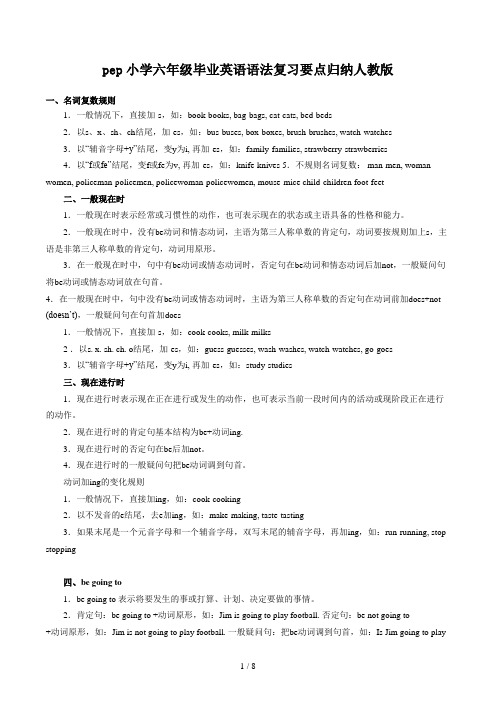
pep小学六年级毕业英语语法复习要点归纳人教版一、名词复数规则1.一般情况下,直接加-s,如:book-books, bag-bags, cat-cats, bed-beds2.以s、x、sh、ch结尾,加-es,如:bus-buses, box-boxes, brush-brushes, watch-watches3.以“辅音字母+y”结尾,变y为i, 再加-es,如:family-families, strawberry-strawberries4.以“f或fe”结尾,变f或fe为v, 再加-es,如:knife-knives 5.不规则名词复数: man-men, woman-women, policeman-policemen, policewoman-policewomen, mouse-mice child-children foot-feet二、一般现在时1.一般现在时表示经常或习惯性的动作,也可表示现在的状态或主语具备的性格和能力。
2.一般现在时中,没有be动词和情态动词,主语为第三人称单数的肯定句,动词要按规则加上s,主语是非第三人称单数的肯定句,动词用原形。
3.在一般现在时中,句中有be动词或情态动词时,否定句在be动词和情态动词后加not,一般疑问句将be动词或情态动词放在句首。
4.在一般现在时中,句中没有be动词或情态动词时,主语为第三人称单数的否定句在动词前加does+not (doesn’t),一般疑问句在句首加does1.一般情况下,直接加-s,如:cook-cooks, milk-milks2 .以s. x. sh. ch. o结尾,加-es,如:guess-guesses, wash-washes, watch-watches, go-goes3.以“辅音字母+y”结尾,变y为i, 再加-es,如:study-studies三、现在进行时1.现在进行时表示现在正在进行或发生的动作,也可表示当前一段时间内的活动或现阶段正在进行的动作。
- 1、下载文档前请自行甄别文档内容的完整性,平台不提供额外的编辑、内容补充、找答案等附加服务。
- 2、"仅部分预览"的文档,不可在线预览部分如存在完整性等问题,可反馈申请退款(可完整预览的文档不适用该条件!)。
- 3、如文档侵犯您的权益,请联系客服反馈,我们会尽快为您处理(人工客服工作时间:9:00-18:30)。
PEP小学英语毕业总复习一:学生易错词汇1. a, an的选择: 元音字母开头的单词用an,辅音字母开头的单词用a.2. am , is , are的选择: 单数用is , 复数用are. I 用 am , you 用are.3. have , has 的选择: 表示某人有某物。
单数用has , 复数用have.I ,you 用 have .4. there is, there are 的选择:表示某地有某物,某人。
单数用thereis , 复数用there are.5. some, any 的选择:肯定句用some, 疑问句和否定句用any.6. 疑问词的选择:what (什么) who (谁) where (哪里) whose (谁的) why(为什么)when(什么时候)which(哪一个)how old (多大) how many (多少)how much(多少钱)二:形容词比较级详解当我们需要对事物作出比较时,需要用到比较级。
比较级的句子结构通常是:什么 + 动词be (am , is , are ) + 形容词比较级 + than(比)+ 什么 ,如:I’m taller and heavier than you. (我比你更高和更重。
)An elephant is bigger than a tiger. (一只大象比一只老虎更大。
)形容词的比较级是在形容词的基础上变化而来的,它的变化规则是:① 一般的直接在词尾加er ,如 tall - taller , strong - stronger ,② 以e结尾的,直接加r ,如 fine – finer ,③ 以辅音字母加y结尾的,先改y为i再加er,如funny - funnier④ 双写最后的字母再加er,如big –bigger, thin –thinner ,hot –hotter ☆注意☆ 比较的两者应该是互相对应的可比较的东西。
典型错误:My hair is longer than you.(我的头发比你更长。
)比较的两者是我的头发、你(整个人),那么比较的对象就没有可比性。
应该改为:My hair is longer than yours. 或My hair is longer than your hair. 比较级专项练习: 一、从方框中选出合适的单词完成句子 heavy tall long big(1) How is the Yellow River?(2) How is Mr Green? He’s 175cm.(3) How are your feet? I wear size 18.(4)How is the fish? It’s 2kg.二、根据句意写出所缺的单词(1) I’m 12 years old. You’re 14. I’m than you.(2) A rabbit’s tail is than a monkey’s tail.(3) An elephant is than a pig.(4) A lake is than a sea.(5) A basketball is than a football.三、根据中文完成句子.(1) 我比我的弟弟大三岁. I’m than my brother.(2) 这棵树要比那棵树高. This tree than thatone.(3) 你比他矮四厘米. You are than he.(4) 谁比你重? than you?四、根据答句写出问句(1) I’m 160 cm.(2) I’m 12 years old.(4) Amy’s hair is 30 cm long.四:动词现在分词详解动词的ing形式的构成规则:①一般的直接在后面加上ing , 如doing , going , working , singing ,eating② 以e 结尾的动词,要先去e再加ing ,如having , writing③ 双写最后一个字母的(此类动词极少)有:running , swimming , sitting , getting五:人称和数1、肯定句:是指用肯定的语气来陈述的句子,如:I’m a student. She isa doctor. He works in a hospital.There are four fans in our classroom. He will eat lunch at 12:00.I watched TV yesterday evening.2、否定句:含有否定词或表示否定意义词的句子,如:I’m not a student.She is not (isn’t) a doctor.He does not (doesn’t) work in a hospital. There are not (aren’t) four fans in our classroom.He will not (won’t) eat lunch at 12:00. I did not (didn’t) watch TV yesterday evening.☆注意☆ 小结:否定句主要是在肯定句的基础上加上了否定词“not”。
有动词be的句子则“not”加在be后面,可缩写成“isn’t,aren’t”,但am not 一般都分开写。
没有动词be的句子则要先在主要动词的前面加上一个助动词(do,does,did),然后在它后面加上“not”,你也可以把它们缩写在一起如“don’t , doesn’t , didn’t )。
这三个助动词要根据人称和时态来选择,其中“does”只用于一般现在时主语是第三人称单数的情况,而“did”只用于一般过去时,不论主语是什么人称和数,都用“did” 。
3、一般疑问句:是指询问事实的句子,此类句子必须用“yes”,或“no”来回答。
如:Are you a student? Yes, I am / No, I’m not.Is she a doctor? Yes, she is. / No, she is n’t.Does he work in a hospital? Yes, he does. / No, he does n’t.Are there four fans in our classroom? Yes, there are. / No, there are n’t. Are you going to buy a comic book tonight? Yes, I am. / No, I am not. (Yes, we are. / No, we are n’t.)Will he eat lunch at 12:00? Yes, I will. / No, I will not(won’t).Are they swimming? Yes, they are. / No, they are n’t.Did you watch TV yesterday evening? Yes, I did. / No, I did n’t.☆注意☆ 小结:一般疑问句是在肯定句的基础上,①把动词be调到首位,其他照写,末尾标点符号变成问号即可。
②没有动词be的句子则要在句首加上一个助动词(do,does,did)再把紧跟在后面的动词变回原形,末尾标点符号变成问号即可。
这三个助动词也要根据人称和时态来选择,其中“does”只用于一般现在时主语是第三人称单数的情况,而“did”只用于一般过去时,不论主语是什么人称和数,都用“did” 。
一般疑问句有个重要的原则就是问和答要一致,即问句里的第一个单词(助动词)和简略答句里的这个词是一致的。
4、特殊疑问句:以特殊疑问词(what , where , who , which , when , whose , why , how等)开头引导的句子。
此类句子应该问什么就答什么,不能用“yes 、no”来回答。
如:What is this? It’s a computer.What does he do? He’s a doctor.Where are you going? I’m going to Beijing.Who played football with you yesterday afternoon? Mike.Which season do you like best? Summer.When do you usually get up? I usually get up at 6:30.Whose skirt is this? It’s Amy’s.Why do you like spring best? Because I can plant trees.How are you? I’m fine. / I’m happy.How did you go to Xinjiang? I went to Xinjiang by train.☆其中how又可以和其他一些形容词连用组成特殊疑问词组用来提问,如: how many(多少(数量)), how much(多少(钱)), how tall(多高), how long (多长), how big(多大), how heavy(多重)例句:How many pencils do you have? I have three pencils.How many girls can you see? I can see four girls.How many desks are there in your classroom? There are 51.☆小结:how many 用来提问可数名词的数量,主要有以上三种句式搭配,How many + 名词复数 + do you have? 你有多少……?How many + 名词复数 + can you see? 你能看见多少……?How many + 名词复数+ are there…? 有多少……?七:完全、缩略形式: I’m=I am he’s=he is she’s=she is they’re=they are you’re=you are there’s=there is they’re=they are can’t=can not don’t=do not doesn’t=does not isn’t=is not aren’t=are not let’s=let us won’t=will not I’ll=I will wasn’t=was not总结:通常情况下,'m即am,'s即is(但let’s=let us), 're即are ,n't即not (但can’t=can not)八:与字母相关的题型 ( 注:五个元音字母是 Aa Ee Ii Oo Uu )一.将所给字母的大小写写在四线格上二.写出下列字母的左邻右舍。
